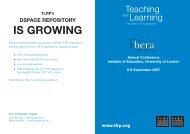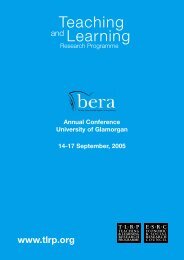Activating Children's Thinking Skills - Teaching and Learning ...
Activating Children's Thinking Skills - Teaching and Learning ...
Activating Children's Thinking Skills - Teaching and Learning ...
Create successful ePaper yourself
Turn your PDF publications into a flip-book with our unique Google optimized e-Paper software.
ACTS Leicester 6thinking skills, enabled them to review their schemes of work <strong>and</strong> encouraged moreeffective planning. Some teachers emphasised the across-the-curriculum effects <strong>and</strong>noted changes in the nature of classroom interaction, that there was an increased level ofinteraction, that group work was more structured, there was more open discussion <strong>and</strong>sharing of ideas <strong>and</strong> that children expected to be "pushed" more.Time was identified as the main constraint. Much of the problem was attributedto relative inexperience with the approach which required more planning <strong>and</strong> pre-classpreparation. The requirement to design lessons which matched topics with appropriatethinking skills was not easy. Teachers also commented that thinking skills lessons oftenwent on for longer than initially planned, <strong>and</strong> that they had to be careful to allow time forthinking <strong>and</strong> not jump in with ready-made answers. <strong>Children's</strong> main difficulty was theabsence of an adequate language for talking about thinking.All teachers commented positively on how useful the ACTS methodology hadbeen for their continuing professional development. All were very experienced teachersyet they commented that "it was a refreshing focus on the nature of learning", "it mademe rethink the way that we, as teachers, teach", "I was delighted to find something new","it encouraged self-evaluation of my own teaching style".As is clear from the above, teachers were very satisfied overall with the ACTSmethodology. They quickly adapted the method to their own teaching style <strong>and</strong> needs(one of the strengths of the approach). Even within a short time they could see benefitsfor the children's thinking, for their own teaching, <strong>and</strong> for the classroom in general.From a training point of view, one of the primary difficulties with the infusionmethodology was enabling teachers to sharpen their underst<strong>and</strong>ing of thinking skills, tokeep the twin perspectives of thinking skill <strong>and</strong> content objectives simultaneously inview, <strong>and</strong> to develop <strong>and</strong> sustain the metacognitive perspective.In the context of developing the infusion methodology, it became increasinglyclear that developing children's thinking goes far beyond an underst<strong>and</strong>ing of howchildren learn. Issues to do with curriculum design, availability of curriculum materials,the nature of pedagogy, teachers' beliefs about learning <strong>and</strong> teaching as well as theirprofessional development came to the fore. Perhaps it was not surprising that theemphasis in the ACTS project shifted from thinking-as-a-skill to concepts such as6
















